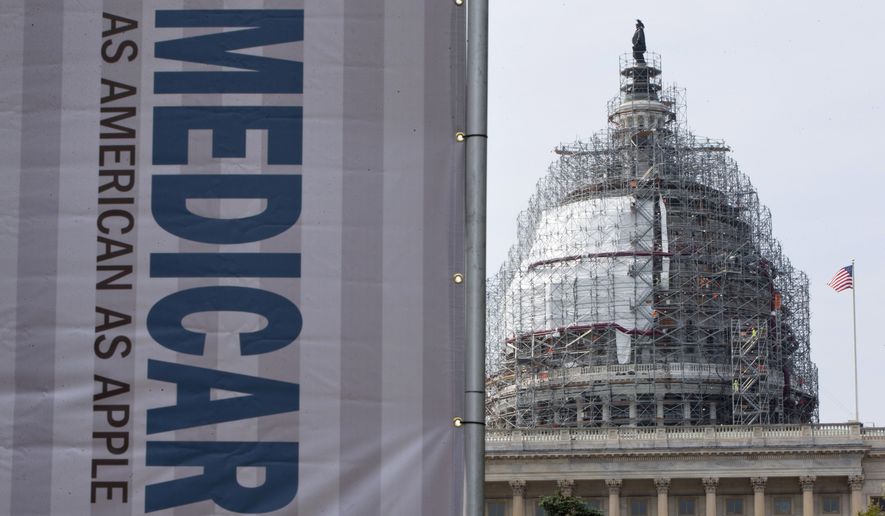ANALYSIS/OPINION:
One of every $10 produced by the U.S. economy in fiscal year 2015 was spent on only three federal programs: Social Security, Medicare and Medicaid. Those three programs alone accounted for nearly half of all federal spending. That’s unsustainable; absent reform, it will only get worse. The next president simply must lead on entitlement reform upon entering office.
The big three entitlements, Social Security, Medicare and Medicaid are growing quickly. Last year alone, their price tag soared by nearly $120 billion, to $1.77 trillion, with Medicaid spending growing the most because Obamacare’s expansion of the program increased enrollment.
Together with interest on the debt, Social Security, Medicare and Medicaid are on track to consume all projected tax revenues by 2033 — the year when today’s kindergarteners prepare to go off to college.
Beyond their impact on the overall federal budget, each of these three programs suffers from its own financial and management maladies.
Social Security is comprised of two major programs: the old age and survivors’ insurance program and the disability insurance program. Combined spending on both programs now approaches $900 billion annually, with both programs paying out more than they’re taking in and their spending authority quickly running out.
Last month’s Obama-Boehner budget deal kept the disability program afloat by authorizing it to dip into spending authority reserved for the old age and survivor’s insurance program. Not only is this robbing Peter to pay Paul, it does nothing to fix the program’s basic problems, as the disability program is projected to be insolvent again in 2021.
The program was supposed to serve only those unable to support themselves because of disability. But it has morphed into an early retirement and long-term unemployment program. Today, one of every 20 Americans taps it for benefits.
The old age and survivors insurance program (what most people think of as “Social Security”) faces an even deeper insolvency crisis: long-term unfunded obligations of more than $12 trillion. Social Security’s deficits over just the next two decades threaten to slash payments to beneficiaries by nearly one quarter. The poorest retirees — those dependent on Social Security for their livelihood — would suffer the most.
To avoid indiscriminate benefit cuts that punish society’s most vulnerable, Congress should enact structural reforms to Social Security that avoid saddling future generations with an even heavier debt or tax burden.
One such reform would raise the retirement age and index it to longevity. Congress should further phase in a predictable, flat benefit that protects beneficiaries from poverty. Moreover, as a real insurance system against poverty due to disability or disabling old age, benefits should focus on those individuals who need them the most. In the long run, private sector alternatives to government insurance programs must be phased in.
As for Medicare, despite $600 billion in annual spending and 50 years of operation, 86 percent of the beneficiaries of the federal health insurance program for people age 65 and older feel the need to enroll in supplemental coverage to fill Medicare gaps. Worse, the fiscal and demographic problems inherent in Medicare’s outdated structure threaten seniors’ future access to quality care and impose massive burdens on taxpayers.
SEE ALSO: Overstock.com hoarding gold, food for employees in case of economic collapse
Congress should transform Medicare into a premium-support program that uses a defined-contribution model of financing. This would make Medicare both fiscally responsible and patient-centered, benefiting both seniors and taxpayers.
Medicaid, originally enacted to provide essential health care access to the poor and the disabled, has expanded significantly in terms of eligibility and scope of its care and services. Mounting fiscal, demographic, and structural challenges strain the federal-state partnership on which Medicaid is based. This harms program beneficiaries and unduly burdens taxpayers.
Congress should repeal Obamacare and put Medicaid on a budget. Medicaid beneficiaries should be able to purchase private insurance of their choice, granting individual enrollees more control over the care and services they receive.
Entitlement spending is the defining domestic challenge of the next Presidency. Whoever wins the Oval Office must be prepared to seriously lead on reform.
• Romina Boccia is the Heritage Foundation’s Grover M. Hermann research fellow in federal budgetary affairs and the deputy director of its Roe Institute for Economic Policy Studies.




Please read our comment policy before commenting.